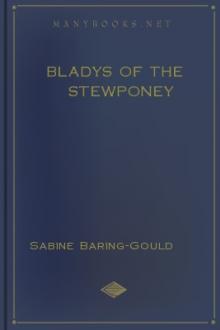The Broom-Squire - Sabine Baring-Gould (life books to read .txt) 📗

- Author: Sabine Baring-Gould
Book online «The Broom-Squire - Sabine Baring-Gould (life books to read .txt) 📗». Author Sabine Baring-Gould
"What can I do?" she asked.
"There's nothin'. Misfortune and wastin' away will be to the child--though they do say, if you was to take it to Thor's Stone, and carry it thrice round, way of the sun, you might cast off the ill-wish. But I can't say. I never tried it."
"I cannot take it there," cried Mehetabel, despairingly, "the weather is too cold, baby too ill."
Then clasping the child to her bosom, and swaying herself, she sobbed forth--
"A little fish swims in the well.
So in my heart does baby dwell,
The king has sceptre, crown and ball,
You are my sceptre, crown and all."
She went home sobbing, and hugging her child, holding it away from the house of Sarah Rocliffe, lest that woman might be looking forth at her window, and deepen by her glance the spell that held and broke down her child.
Towards evening fall Jonas returned.
Directly he crossed the threshold, with palpitating eagerness Mehetabel asked--
"Have you seen the doctor?"
"Yes," he answered curtly.
"What did he say?"
"He'd got a pass'l o' learned names of maladies--I can't recollect them all. Tain't like as I should."
"But--did he give you any medicine?"
"Yes, I had to pay for it too."
"Oh, Jonas, do give it me, and tell me, are you quite sure you explained to him exactly what ailed baby?"
"I reckon I did."
"And the bottle, Jonas?"
"Don't be in such a won'erful hurry. I've other things to do than get that put yet. How is the child?"
"Rather better."
"Better!" he echoed, and Mehetabel, who looked intently in his face, saw no sign of satisfaction, rather of disappointment.
"Oh, Jonas!" she cried, "is it naught to you that baby is so ill? You surely don't want him to die?"
He turned fiercely on her, his face hard and gray, and his teeth shining--
"What makes you say that--you?"
"Oh, nothin', Jonas, only you don't seem to care a bit about baby, and rather to have a delight in his bein' so ill."
"He's better, you say?"
"Yes--I really do think it."
There was an unpleasant expression in his face that frightened her. Was it the eye of Jonas that had blighted the child? But no--Karon Boxall had said that it was ill-wished by a woman. Jonas left the room, ascended the stairs, and strode about in the chamber overhead.
Swaying in her chair, holding the infant to her heart, the sole heart that loved it, but loved it with a love ineffable, she heard her husband open the window, and then hastily shut it again. Then there was a pause in his movement overhead, and he came shortly after down the stairs. He held a phial in his hand--and without looking at Mehetabel, thrust it towards her, with the curt injunction, "Take."
"Perhaps," said the young mother, "as my darling is better, I need not give him the medicine."
"That's just like your ways," exclaimed the Broom-Squire, savagely. "Fust I get no rest till I promise to go to the doctor, and then when I've put myself about to go, and bring the bottle as has cost me half-a-crown, you won't have it."
"Indeed--it is only----"
"Oh, yes--only--to annoy me. The child is ill. I told the doctor all, and he said, that this would set it to rights and give it sleep, and rest to all of us." He was in a bad temper. Mehetabel did not venture to say more. She took the phial and placed it on the table. It was not wrapped up in paper.
Then Jonas hastily went forth. He had old Clutch to attend to.
Mehetabel remained alone, and looked at the medicine bottle; then she laid the infant on her knees and studied the little face, so blanched with dark rings round the eyes. The tiny hands were drawn up on the breast and clasped; she unfolded and kissed them.
Then she looked again at the phial.
There was something strange about it. The contents did not appear to have been well mixed, the upper portion of the fluid was dark, the lower portion white. How came this about? Jonas had ridden old Clutch home, and the movements of the horse were not smooth. The bottle in the pocket of Bideabout must have undergone such shaking as would have made the fluid contents homogeneous and of one hue. She held the bottle between herself and the light. There was no doubt about it, either the liquid separated rapidly, or had never been mixed.
She withdrew the cork and applied the mouth of the phial to her nose.
The scent of the medicine was familiar. It was peculiar. When had she smelt that odor before. Then she started. She remembered the little bottle containing laudanum, with the death's head on it, in the closet upstairs.
Hastily, her heart beating with apprehension, she laid her babe in the cradle, and taking the light, mounted to the upper chamber. She possessed the key of the cabinet in the wall. She had retained it because afraid to give it up, and Jonas had manufactured for himself a fresh key.
Now she unlocked the closet, and at once discovered the laudanum bottle.
It was half empty.
Some of it had been used.
How had it been used? Of that she had little doubt. The dangerous, sleep-bringing laudanum had been put into the medicine for the child. It was to make room for that that Jonas had opened the window and poured forth some of the contents.
A drop still hung on the top of the phial.
She shut and relocked the cupboard, descended, with dismay, despair in her heart, and taking the bottle from the table, dashed it into the fire upon the hearth. Then she caught her babe to her, and through floods of tears, sobbed: "There is none love thee but I--but I--but only I! O, my babe, my babe! My sceptre, crown, and all!"
In the blinding rain of tears, in the tumult of passion that obscured her eyes, that confused her brain, Mehetabel saw, heard nothing. She had but one sense--that of feeling, that thrilled through one fibre only attached to the helpless, suffering morsel in her arms--the infant she held to her breast, and which she would have liked to bury in her heart away from all danger, concealed from the malevolent eye, and the murderous hand.
All the mother's nature in her was roused and flared into madness. She alone loved this little creature, she alone stood between it and destruction. She would fight for it, defend it to her last breath, with every weapon wherewith she was endowed by nature.
After the first paroxysm of passion was passed, and a lull of exhaustion ensued, she looked up, and saw Bideabout enter, and as he entered he cast a furtive glance at the table, then at the child.
In a moment she resolved on the course she should adopt.
"Have you given the babe the draught?" he asked, with averted face.
"Not all."
"Of course, not all."
"Will it make baby sleep?" asked Mehetabel.
"O, sleep--sleep! yes--we shall have rest for one night--for many, I trust. O, do not doubt. It will make it sleep!"
CHAPTER XXXVII.
A MENACED LIFE.
As soon as the Broom-Squire had gone out again to the "hog-pen," as a pigstye is called in Surrey, to give the pig its "randams and crammins," because Mehetabel was unable to do this because unable to leave the child, then she knelt by the hearth, put aside the turves, and, regardless of the fire, groped for the fragments of the broken phial, that nothing might betray to Bideabout her having rejected the medicine with which he had tampered.
She cut and burnt her fingers, but in the excitement of her feelings, was insensible to pain.
She had removed and secreted the glass before he returned. The babe was sleeping heavily, and snoring.
When Jonas came in and heard the sound from the cradle, a look of expectation came over his face.
"The child's burrin' like a puckeridge (night-jar)," he said. "Shouldn't wonder if the medicine ain't done him a lot o' good. It don't need a doctor to come and see to prescribe for a baby. All that little ones want is good sleep, and natur' does the rest."
Owing to the annoyance caused to Bideabout by the child's fretfulness during the night, Mehetabel occupied a separate chamber, the spare bedroom, along with her babe, and spent her broken nights under the great blue and white striped tent that covered the bed.
She had enjoyed but little sleep for several nights, and her days had been occupied by the necessary attention to the suffering child and the cares of the household. Because the babe was ill, that was no reason why his father's meals should be neglected, and because the mother was overwrought, he was not disposed to relieve her of the duties to the pigs and cows save on this one occasion.
That the poor little infant was really more at ease was obvious to the mother's watchful eye and anxious heart, but whether this were due to its malady, whatever that was, having taken a felicitous turn, or to mere exhaustion of powers, she was unable to decide, and her fears almost overbalanced her hopes.
She retired to sleep that night without much expectation of being able to obtain sleep. Her nerves were overstrung, and at times thought in her mind came to a standstill; it was as though a sudden hush came on all within her, so that neither did heart beat nor breath come. But for these pauses, her mind might have given way, a string have snapped, and her faculties have fallen into disorder.
It is said of Talleyrand that he needed no sleep, as his pulse ceased to beat after a certain number of strokes, for a brief space, and then resumed pulsation. During that pause, his physical and mental powers had time for recuperation. Be that as it may, it is certain that to some persons whose minds and feelings are put to extraordinary tension, greatly prolonged, there do come these halts in which all is blank, the brain ceases to think, and the heart to feel, and such gaps in the sequence of thought and emotion have a salutary effect.
Mehetabel did not undress. She had not put off her clothing for several nights. The night was cold, and she would probably have to be incessantly on the move, to meet the little sufferer's necessities, as they arose, and to watch it, whenever her fears prevailed over her hopes, and made her think that a protracted quiet was ominous.
The only light in the room emanated from a smouldering rush, sustained in a tall iron holder, the lower end of which was planted in a block of oak, and stood on the floor. Such holders, now become very scarce, were furnished with snuffers, so contrived that the rushlight had to be taken out of its socket and snuffed by them, instead of their being brought to the rush.
Of rushlights there were two kinds, one, the simplest, consisted of a dry rush dipped in a little grease. The light emitted from such a candle was feeble in the extreme. The second, a superior rushlight, had the rush pealed of its bark





Comments (0)